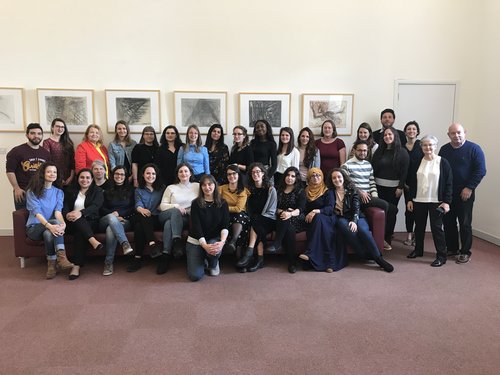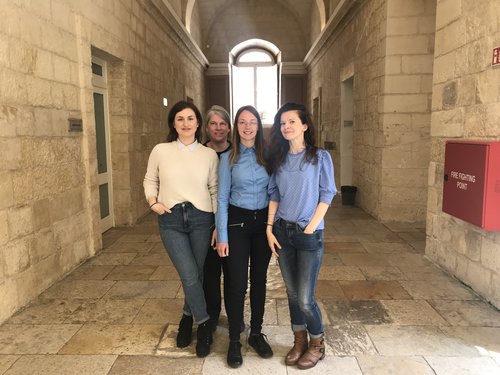Doctoral Study Program Humanities
The doctoral study program Humanities is based on intellectual exchange of foreign and Slovenian teaching staff, researchers, and students in the humanities and social sciences.
| Study programme: | Doctoral study programme Humanities |
|---|---|
| Main fields of study: | Literary Studies, Migrations and Intercultural Relations, History |
| Programme code: | 3HUM |
| Programme cycle: | Third cycle doctoral degree |
| Name of the qualification: | Doctoral diploma |
| Qualification title: | Doctor of Philosophy |
| Qualification abbreviation: | Ph.D. |
| Final examination: | no |
| Dean: | prof. dr. Martina Bergant Marušič |
| Programme director: | prof. dr. Ana Toroš |
| ECTS coordinator: | prof. dr. Iztok Arčon |
Enrollment in the study programme Humanities 2024/25
The four-year study programme Humanities offering an international academic environment and an individual study approach is based on three main research areas: literary studies, history, migration and intercultural relations.
Among other fields of research, it also supports research based on the rich cultural heritage of the region between Italy and Slovenia (e. g. cross-border literature).
The course-timetable will take into account your other (professional) commitments.
Programme description
The doctoral study program Humanities is based on intellectual exchange of foreign and Slovenian teaching staff, researchers, and students in the humanities and social sciences. The program combines some traditional, classic knowledge and approaches with interdisciplinary and comparative approaches, thus enhancing historical, social, and political contextualization of relevant issues. The program transcends the limits of conventional disciplines and cultural boundaries, and promotes critical analysis of contemporary global issues.
Study-programme description (May 2007)
Summary of additions and changes to the study programme (2011 - 2016)
Study-programme additions and changes (May 2014)
Study-programme additions and changes (January 2016)
Extension of the study programme to 4 years (January 2017)
Study-programme additions and changes (2018 - 2025)
Different study modules
The doctoral study program Humanities consists of three modules, Literary Studies, Migrations and Intercultural Relations and History.
The Senate of the University of Nova Gorica at its 75th session held on 18 January 2017 approved the extension of the IIIrd level study program Humanities from the current three years (180 ECTS) to four years (240 ECTS).
The four-year doctoral programme has started in the academic year 2017/2018.
Students who are currently enrolled in the three-year study programme will complete studies at the three-year programme.
Admission requirements
To qualify for entry into the doctoral study program Humanities, applicants must satisfy the following admission requirements:
- have completed a 2nd cycle master’s study programme;
- have completed at least a four-year academic undergraduate programme accredited with 240 ECTS credits;
- have completed a uniform five year master’s study programme accredited with 300 ECTS credits;
- have completed a specialization after previously finished professional study programme, and had passed additional study obligations within 30 to 60 ECTS credit points;
- have completed an equivalent program abroad;
If the number of applicants exceeds the 20 available slots, they are selected based on previous academic achievement.
Educational and professional goals
The doctoral study programme Humanities concentrates on three scientific fields: Literary studies, History and Migration and intercultural relations. Studying literary sciences allows students to acquire up-to-date expertise in methodology and theory, indispensable in the research of literature as well as of social phenomena reflected in literary works. The students› research topics can therefore concentrate on one of the following areas of literary sciences: literatures in contacts, imagology in literary studies, translation as a means of transcultural communication, literature and cultural nationalism in Europe, literary journalism as a transnational and transgeneric discourse, gender and literature, identity and languages.
PhD program in history is based on modern conceptual and methodological backgrounds in historical science to train the students for research work, for the understanding and historical contextualization of the development of societies in a comparative perspective. The study program focuses on a comprehensive critical analysis of "different historical realities" and phenomena in the field of cultural, social, economic and political development. This enables the understanding and interpretation of the modern world from the historical point of view.
Studying migration and intercultural relations equips students with contemporary methodological and theoretical knowledge, enabling them to understand the phenomenon of migration, to confront the present migratory processes and phenomena, and to understand the identification processes (and the related choice of language) in a multilingual environment.
PhD Graduates of the doctoral study programme Humanities are fully competent to perform further, independent professional and scientific-research tasks and may pursue careers in domestic and foreign institutions or organisations seeking experts in the field of humanities.
Assessment
Each course has three exam dates set at the beginning of the year. The rules of the exam process depend on the content and course’s specific characteristics; the exam may thus consist of either exam papers or projects, and particular attention is paid to oral exams. This encourages a more active and creative approach, focusing on developing speaking skills and coherent argumentation in a discussion. Individual research will be evaluated for each year with a research report submitted by the student to the mentor and programme director for review and approval. The exact rules concerning exam procedures are given in each course description. Ten days after the student passes the exam and no later than 30 September of the academic year, the instructor must submit a written statement to the Graduate Studies Administrator stating whether a student passed the exam or not. The program is completed when the PhD qualifying exam is taken before a three-member committee.
Once enrolled, the student chooses a supervisor in a relevant field and selects course units for a total of 18 credits (6 credits of required courses and 12 credits of elective course units); this selection must be approved by the supervisor. These courses can be also selected from other institutions’ programs. In the first year, in agreement with the supervisor, the student prepares an extensive term paper related to his or her doctoral dissertation, consisting of a relevant literature review and presentation of the state of the art in the field. The presentation and defense of the assignment must be completed in the first year. Presentation of this assignment and at least 75% participation in a research seminar is worth 26 credits, and an additional 16 credits may be acquired by conducting research defined in agreement with the supervisor at the beginning of the year. Before proceeding to second year, the student must:
- Pass an exam in a required course unit
- Fulfill research seminar requirements a (term paper and 75% course participation)
- Conduct independent research
In order to enter the second year, the student must have earned at least 48 of 60 credits. Before proceeding to the third year, the student must:
- Pass all first- and second-year exams
- Satisfy research seminar requirements (75% participation)
- Conduct independent research
In order to enter the third year, the student must have 120 credits. Once in the third year, the student is required to do research leading to a dissertation (60 ECTS). The condition for enrollment in the fourth year is that all the obligations of the first three years (180 ECTS) have been completed.
In the fourth year, the student fully devotes himself to the research part IV (30 ECTS), which results in a successful defense of the doctoral dissertation (30 ECTS).
Doctoral degree candidates must complete lectures, practicals, individual research work and public presentation, argumentation and defence of doctoral dissertation and successful defence of the doctoral dissertation (30 ECTS), for which a student receives 240 ECTS.
Conditions for repeating the year
Students can re-enroll in the first year if they accumulate at least 18 ECTS credits from that year.
Students can repeat a year only once during their studies.
A student whose student status is terminated retains the right to fulfill the remaining study obligations of the last year enrolled for two years more after the termination of the student status.
Extension of student status
The third-level student status expires if the student fails to complete the postgraduate programme within 12 months of the completion of the final programme semester.
Provisions for transferring between programmes
Students may transfer from other doctoral programmes:
To students and graduates of any postgraduate doctoral programme of any higher-education institution the subject holders may recognise examinations that meet the standards of the University of Nova Gorica in terms of difficulty and are at least 70 % identical in content to the content of the courses in the proposed study program. In order to transfer directly to the second year, the student must accumulate the same number of points as the students of the proposed study programme, i.e. at least 48 ECTS, otherwise he/she can only enroll in the first year.
In addition, the student may transfer and apply for completed study commitments of up to 12 ECTS from any doctoral program at any university or lifelong learning programme of the same level of difficulty:
- During the studies, the student may complete a part of the study obligations of up to 60 ECTS (up to two semesters) in other ECTS-evaluated study programmes of the same level at the University of Nova Gorica or other higher-education institutions in Slovenia or abroad. This requires the prior approval of the Scientific Board of the study programme and the Senate of the University of Nova Gorica and, in the case of another institution, the conclusion of a tripartite agreement between the student and both institutions.
- If there is such an agreement between the institutions, the student may also carry out individual research work at another institution.
To the same extent and under the same conditions, it is possible for students from other study programmes who wish to do so to fulfill their study obligations in the proposed programme.
To facilitate interchangeability, the program is organised in such a way that all courses take place semester by semester.
Graduates of previous degree programmes leading to a Master of Science degree or a specialisation after completing the degree programme leading to a third-level doctorate will be recognised for study obligations amounting to 60 ECTS credit points.
Conditions for the completion of the study programme
The conditions for graduation are the accumulated 240 ECTS, i.e. passing all examinations (30 ECTS), the individual research work prescribed by the programme (150 ECTS), fulfilling the obligations in the research seminar (30 ECTS) and the successful defense of the dissertation (30 ECTS). The student completes his or her studies with a positive evaluation of the dissertation and its defense.
The University of Nova Gorica gives a public doctoral diploma to students who fulfill all the obligations under this program.
Courses refresh
1. year
| Compulsory courses | Hours | ECTS |
|---|---|---|
| Individual Research Work I | 480 | 16 |
| Research Seminar I | 780 | 26 |
| Research, Argumentation, and Writing Methods in the Humanities and Social Sciences | 180 | 6 |
| General elective courses | Hours | ECTS |
| Elective subjects | - | 12 |
Module Literary Studies
| General elective courses | Hours | ECTS |
|---|---|---|
| Crossing the borders: literary journalism as a transnational and transgeneric discourse | 180 | 6 |
| Gender and Literature | 180 | 6 |
| Identity and language | 180 | 6 |
| Imagology in Literary Studies | 180 | 6 |
| Literature and Cultural Nationalism in Europe | 180 | 6 |
| Literatures in contacts | 180 | 6 |
| Translation as a means of transcultural communication | 180 | 6 |
Module Migration and Intercultural Relations
| General elective courses | Hours | ECTS |
|---|---|---|
| Gender and Migration | 180 | 6 |
| History of migrations | 180 | 6 |
| Migration and Creativity | 180 | 6 |
| Migration and culture: concepts and precepts | 180 | 6 |
| Migration in discourses on population dynamics | 180 | 6 |
| Migration, Borders and Citizenship | 180 | 6 |
| Theorising Migration | 180 | 6 |
Module History
| General elective courses | Hours | ECTS |
|---|---|---|
| Economic and social transformations in historical perspective | 180 | 6 |
| Greco-Roman Antiquity and the Modern European Ideas | 180 | 6 |
| Intellectuals and intelligentsia | 180 | 6 |
| Society in the age of modernization | 180 | 6 |
| The twentieth century – the century of globalisation | 180 | 6 |
2. year
| Compulsory courses | Hours | ECTS |
|---|---|---|
| Individual Research Work II | 1320 | 44 |
| Research Seminar II | 120 | 4 |
| General elective courses | Hours | ECTS |
| Elective subjects | - | 12 |
Module Literary Studies
| General elective courses | Hours | ECTS |
|---|---|---|
| Crossing the borders: literary journalism as a transnational and transgeneric discourse | 180 | 6 |
| Gender and Literature | 180 | 6 |
| Identity and language | 180 | 6 |
| Imagology in Literary Studies | 180 | 6 |
| Literature and Cultural Nationalism in Europe | 180 | 6 |
| Literatures in contacts | 180 | 6 |
| Translation as a means of transcultural communication | 180 | 6 |
Module Migration and Intercultural Relations
| General elective courses | Hours | ECTS |
|---|---|---|
| Gender and Migration | 180 | 6 |
| History of migrations | 180 | 6 |
| Migration and Creativity | 180 | 6 |
| Migration and culture: concepts and precepts | 180 | 6 |
| Migration in discourses on population dynamics | 180 | 6 |
| Migration, Borders and Citizenship | 180 | 6 |
| Theorising Migration | 180 | 6 |
Module History
| General elective courses | Hours | ECTS |
|---|---|---|
| Economic and social transformations in historical perspective | 180 | 6 |
| Greco-Roman Antiquity and the Modern European Ideas | 180 | 6 |
| Intellectuals and intelligentsia | 180 | 6 |
| Society in the age of modernization | 180 | 6 |
| The twentieth century – the century of globalisation | 180 | 6 |
3. year
| Compulsory courses | Hours | ECTS |
|---|---|---|
| Individual Research Work III | 1800 | 60 |
4. year
| Compulsory courses | Hours | ECTS |
|---|---|---|
| Dissertation | 900 | 30 |
| Individual research work 4 | 900 | 30 |



